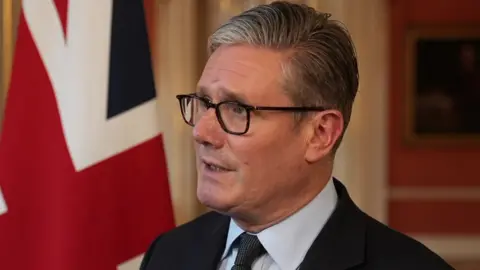In a recent escalation of tensions in the Middle East, Prime Minister Sir Keir Starmer has called for both Iran and Israel to exercise restraint following Israeli military actions targeting Iran’s nuclear program. This situation has raised concerns about the potential for full-scale conflict, particularly in light of aggressive statements from Iranian leadership, including a warning of “severe punishment” issued by Supreme Leader Ayatollah Ali Khamenei. The military actions, which reportedly involved drone strikes, have provoked alarm within the international community.
The backdrop to this urgent situation was recent strikes attributed to Israel, which officials claim were aimed directly at Iran’s nuclear facilities and military assets. As fears mounted, a Cobra meeting, which is a high-level emergency response meeting in the UK, was convened to discuss the appropriate governmental response. Foreign Secretary David Lammy has canceled a previously planned trip to Washington, D.C., signaling the gravity of the situation, although there are currently no planned statements in the House of Commons regarding this crisis.
UK officials have clarified that the United Kingdom did not partake in the Israeli offensive that occurred overnight but are maintaining vigilance over developments in the region. Prime Minister Starmer emphasized the importance of de-escalation, stating, “The reports of these strikes are concerning, and we urge all parties to step back and reduce tensions urgently. Escalation serves no one in the region.” He reiterated the necessity for stability in the Middle East and affirmed that diplomatic engagement with partners is paramount in mitigating the crisis.
Echoing the Prime Minister’s concerns, Lammy also utilized social media to highlight the importance of stability in the region as critical to global security. He expressed that further escalation presents a significant threat not only to peace in the Middle East but also affects broader international relations. In response to a complex and volatile environment, Lammy urged a focus on restraint from all involved parties.
Israeli Prime Minister Benjamin Netanyahu justified the military operation, stating that the strikes had been aimed at what he described as the “heart” of Iran’s nuclear enrichment agenda and emphasized that operations would continue as needed to neutralize perceived threats. Reports indicate that high-ranking military officials within Iran, including the head of the paramilitary Revolutionary Guard, Hossein Salami, and the chief of staff of the Iranian armed forces, General Mohammad Bagheri, have been killed as a result of these strikes.
In light of escalating hostilities, some UK political figures voiced concerns and called for a unifying diplomatic approach. Conservative Shadow Foreign Secretary Dame Priti Patel urged the government to leverage its influence to advocate for stability in the region, reiterating that international leadership is essential amidst growing dangers to national and global security. Meanwhile, Liberal Democrat leader Sir Ed Davey stressed that the UK Government should collaborate with allies to address Iran’s nuclear ambitions not through military intervention but through diplomacy, spotlighting the urgency for the UK to step up in a rapidly changing geopolitical landscape.
Overall, in these tumultuous times, there are serious implications for international relations and security as regional tensions escalate. The situation remains fluid, with calls for calm and emphasis on diplomatic solutions underscoring the intricate dynamics at play between Iran, Israel, and the broader world. Both domestic and international responses will be crucial as the situation develops in the days and weeks to come.



